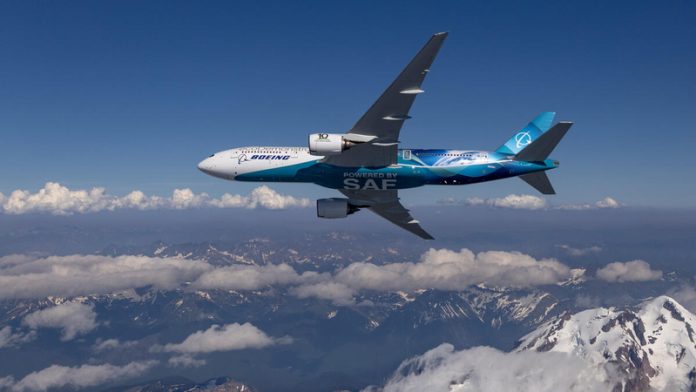A new study by Cyan Ventures, with support from Boeing, suggests that producing sustainable aviation fuel (SAF) within New Zealand to supply 30% of the country’s jet fuel demand by 2050 could generate NZD 1.3 billion in Gross Value Added (GVA) and create around 5,700 jobs. The move would also enhance New Zealand’s fuel security and support its climate goals.
“There’s a compelling case to strengthen New Zealand’s long-term aviation fuel supply with SAF. It’s a pathway to both economic growth and emissions reduction,” said Dr. Kimberly Camrass, Boeing’s acting Regional Sustainability Lead for Asia Pacific. “We have a real opportunity to act now, with a clear direction to move forward.”
The report highlights the importance of defining appropriate feedstocks and certification standards for SAF, integrating SAF into the Emissions Trading Scheme, and developing a policy framework that encourages investment. Establishing a strong signal of demand and commitment from leadership is also seen as essential to attract investment.
In addition to economic and environmental benefits, the study notes that embracing SAF could help protect an estimated NZD 4.1 billion in tourism revenue and NZD 200 million in trade revenue through 2050. As more countries move to decarbonize aviation, demand for SAF is expected to become standard for both businesses and travelers.
Dr. Camrass also emphasized the strategic importance of reducing New Zealand’s dependence on imported jet fuel. “A domestic SAF supply is not just about emissions—it’s about safeguarding New Zealand’s energy security. If we don’t act, aviation could account for up to 22% of the country’s gross emissions by mid-century,” she said.
SAF is made from renewable resources such as agricultural and forestry residues, used cooking oil, animal fats, and municipal solid waste. Compared to traditional jet fuel, SAF can substantially cut greenhouse gas emissions over its full lifecycle.
While currently more expensive than fossil-based alternatives, the study notes that introducing SAF at 5% of total aviation fuel use by 2030 would keep New Zealand in line with regional peers and cost passengers less than a cup of coffee on a one-way domestic flight, a cost that may be offset by attracting 1.2% more air travelers.
Globally, over 190 countries, including New Zealand, have committed through the International Civil Aviation Organization to reducing the carbon intensity of aviation fuels by 5% by 2030. About 45 nations, including all of New Zealand’s top ten trading partners, have either introduced or pledged to implement SAF policies.
The findings were presented at the Aviation Decarbonisation Policy Roundtable held in Wellington, part of Boeing’s broader initiative to support the aviation sector’s net-zero emissions target by 2050.
Boeing, a global leader in aerospace and the largest U.S. exporter, designs, manufactures, and services aircraft, defense systems, and space technology in more than 150 countries. The company continues to prioritize innovation, sustainability, and community engagement through its international workforce and supplier network.















